FAMILY 01 – GENESIS FOUNDATIONS
Genesis 1:26-27
creation of humans
“Then God said, “Let us make humankind in our image, according to our likeness; and let them have dominion over the fish of the sea, and over the birds of the air, and over the cattle, and over all the wild animals of the earth, and over every creeping thing that creeps upon the earth.” 27 So God created humankind in his image, in the image of God he created them; male and female he created them.”
- ‘Let us make humankind in our image’ God is triune. The Trinity is in relationship, the Trinity is the first family, the Trinity is a community > this is a foundational truth.
- God is the creator of relationship, of humans, of gender, of marriage, of sex, of family, of homes, of community … all this is wanted by him, all this reflects him, all this is good.
- God is also himself the model for human relationships.
- God and humans: Humans are in the image of God, like him in many more ways and higher dimensions than any other created thing. Humans are persons, like God, with self-awareness, mind, will, emotion, decision power. Though God is uncreated, infinite and unlimited, unlike humans, still humans are like God in person hood.
- Humans and animals: Though humans and animals are both created, wanted and given life by God, their value is different and different standards apply: to kill a human is murder, to kill an animal is not (Ge 9:1-5). Humans are held accountable for choices, animals (having no morality, conscience of choice) are not.
- Gender: Both genders are in God’s image. God is revealed by both genders. God – the Trinity! – is revealed in the relationship of the two genders.
- Triplet 1:27 is poetry, a synthetic parallelism of three lines (instead the usual two!), 1 humankind created, 2 in his image created, 3 as two genders created.
- Poetry expresses God’s joy and excitement, the beauty of what he does, the importance of what is being said. So: listen up! Enjoy the wonder! Take it in!
- Man is created in the image of God, woman is created in the image of God. What are the implications of this on the question: Does God have gender? Is God male? Two options:
- God is male, since the description of God in the Bible uses ‘Father’, ‘son’, ‘warrior’, ‘king’ … male metaphors abound. Jesus when incarnate takes a male body, not a female one.
- God is beyond gender, for he created and is reflected in both genders. He is bigger than gender, he is not ‘like one part’ only. Admittedly male metaphor’s abound, but by no means used exclusively. ‘Giver of life’, ‘birthing nations (Isa 66:8-9)’, ‘giving birth to believers (Gal 4:19)’, ‘comforting as a mother, breast fed Jerusalem’ (Isa 66:12-13), ‘gathering chicks like mother hen’ (Mth 23:37, Luk 13:34), … are metaphors with female themes.
- What is his purpose of family? Family is created for relationship, for revealing the God of relationship, for love, mutual support, generosity, big mindedness, nurturing, development … one human alone would still have relationship with
God, but God desires human-human relationship, which is again his generosity. - In Gen 1-2 God establishes both the individual and the family, both are important, both are essential, both are wanted, both have rights and duties. Individual and family are in balance. Relationship are made by individuals, yet by individuals who are relationship-orientated. The same is visible in the Trinity: three persons but in relationship and complete unity.
- In contrast, a monistic religion has no concept of relationship within God, since God is one. Therefore there is a different view of the importance of relationship. Therefore also it has a different view of the importance of diversity. Gen 1 celebrates diversity as a God-given design, anchored in God himself and expressed best in human marriage. And all this is ‘very good’ (Gen 1:31).
Gen 1:28
Be fruitful! Multiply! Fill the earth! Subdue! Have dominion!
“God blessed them, and God said to them, “Be fruitful and multiply, and fill the earth and subdue it; and have dominion over the fish of the sea and over the birds of the air and over every living thing that moves upon the earth.”
- God communicates: “God said to them”. God expresses relationship, a desire to reveal himself, to share himself.
- Humans, both male and female are given dominion, leadership, stewardship, responsibility over the animal world jointly. Psa 115:16 puts is this way: “The heaven’s are the LORD’s heavens, but the earth he has given to human beings.”
- What is rulership? Leadership? Authority? Dominion? It is defined in the first few chapters by God’s character and actions, he who is the ultimate ruler and authority.
- How does his ruling look? > creative power (creating by mere word, giving life), ordering power (> makes beautiful, good, functional cycles), providing power (food for categories of creatures), redeeming power (looking for redemption after the fall).
- This is what ruling is. This is what human ruling needs to model itself after.
- God’s lavish generosity and goodness is revealed: He gives humans life, existence, gender, relationship, dominion, blessing, a development mandate, provision, everything!
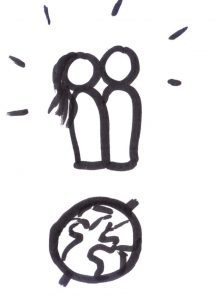
- Humans are to be fruitful, to increase, to create something outside themselves (like God has), to multiply (not arithmetically but exponentially).
- God commands: growth, increase, development, multiplication, differentiation, pass down … this will require things like law, government and science, which is therefore God-commanded, God-intended and not enemies, not unwelcome necessities, not brought about by the reality of sin but part of God’s design, a blessing and a challenge, opportunity and development.
- God commands growth, and provides for growth right along with it
- Principle of Reproduction: whatever I am, I will reproduce myself, good or bad. In science one characteristic of what is defined as “life” or “alive” is reproduction.
- Command to rule over creatures and the world, not over each other. No hierarchy is even hinted at. God later (1 Sam 8) will counsel against political hierarchy (no king!), and when they choose a king anyway, God instructs the king not to exalt himself above his brothers (Deu 17:20). God doesn’t instruct hierarchy as such, though he puts people into leadership. Also Jesus defines very clearly what ruling means: Not to lord it over others but to be the servant of all (Mth 20:25-27). Paul says: “I do not mean to imply that we lord it over your faith; rather, we are workers with you for your joy” (2 Cor 1:24).
- Command to “fill the earth” implies: spread out, reproduce yourself, take possession, risk, explore, discover, pioneer, advance, take possession, adjust, learn to live, make your own, tame, domesticate, … a high and multifaceted job
- All this is the responsibility or job description of man and woman, for both together, both are needed for this leadership, this task.
- Some describe marriage with the following metaphor: the man is the seed sower or gardener and the woman is the ground or garden. In this picture there is a higher focus on sex and procreation and less focus on companionship or emotional intimacy. The wife is not so much her husband’s partner in work, calling, purpose, decision making; there is no demand that this must be done in communion and unity (as in Gen 1:28). Also a man can have several gardens (polygamy). Some even say that a garden that doesn’t produce fruit can be cast aside (demand for procreation).
- God’s evaluation is: good, good, good, good, now very good! God evaluates his own work, rejoices in what he made. This is a wholesale affirmation of the physical world.
- Often humans are described as ‘obedient’ here, in contrast to Gen 3:6, where they become ‘disobedient’. That is true in one sense, but the word ‘obedience’ is so often tainted negative in our minds.
- But really, what is their obedience? To rule, to multiply, to fill the earth, to eat of thousands of trees. We can hardly call that a drab, sacrificial sour obedience, rather we could call that a celebration of who God made them, a walking in relationship with God.
- Illustration: filling gas into my car. Car manual says not to fill anything but gas into the tank. And I do so. Am I slavishly obedient to the car manufacturer? No, I’m not – I don’t obey because I fear the car manufacturer or punishment -, I do it because I know that’s how he made the car to function. I obey with understanding and willingly. Definition of obedience: understanding, willing, appreciating cooperation out of trust.
Gen 2:4b-7
forming Adam (plural)
“In the day that the LORD God made the earth and the heavens … 7 then the LORD God formed man (‘human’, plural) from the dust of the ground, and breathed into his nostrils the breath of life; and the man became a living being.”
- Why this ‘second account’? It gives more detail on the creation of humans, it sets humans apart as a special creation, as being in special relationship with God.
- Adam here again is a plural, a collective term, should be translated ‘humans’ or ‘humankind’.
Gen 2:15
work, assignment, purpose, stewardship
- Since in Ge 1:28 the call, mandate, blessing, command and authority was given to both, here as its extension work and stewardship is given to both.
- Affirmation of the physical world, of physical body and its physical need, of work, of human time, of humans’ leadership.
Gen 2:18-20
not good to be alone, animals not appropriate
“Then the LORD God said, “It is not good that the man should be alone; I will make him a helper as his partner. 19 So out of the ground the LORD God formed every animal of the field and every bird of the air, and brought them to the man to see what he would call them; and whatever man called every living creature, that was its name, 20 The man gave names to all cattle, and the birds of the air, and to every animal of the field; but for the man there was not found a helper as his partner.”
- To be in relationship is essential for life. Marriage is its highest (but not only) expression. It’s good to get married, but more than that, humans need to be in relationship. For a being made in the image of the Trinity, to be without relationship is inappropriate, humans are created to need relationships. Humans are created to reveal the Trinity.
- This is about marriage, but also about the nature of humans in general,
- By the ‘animal-search’ God is showing Adam his need, the need for relationship, the value of relationship, showing him what he needs (by showing him what won’t do), this is a discovery or learning process
- Process of seeing the animals and naming them … Why? To name, to categorize, to understand its essence, to realize it is not of his kind, none is in the image of God … a process of discovery and self-discovery
- God will make a “helper”, “partner” “ezer “… which means: one powerful to help. This word is used 14x in the OT:
- 1x here in Gen 2:18 … for Eve
- 1x in 2 Kin 14:26 … for a political deliverer
- 12x Psa 10:14, 30:10, 54:4, 72:12 … for God, as the Helper of Israel
- “kneged” … appropriate, like him, matching, fitting, same nature, একই জাত, a ‘Gegenüber’ (German).
- The creation of woman is not anew, not from the ground, or out of mere ‘speaking’, but rather a differentiating out for the 5th time (4x in Ge 1), a ‘taking from man’, separation out of an existing thing, again stressing its equality.
- God takes a rib, from the side, which creates a horizontal picture, same level, not hierarchy but equality, sameness, evenness, mutuality or equals, standing together, co-workers, relating horizontally
- The separation is reverted by marriage relations.
Gen 2:21-23
Eve
“So the LORD God caused a deep sleep to fall upon the man, and he slept; then he took one of his ribs and closed up its place with flesh. 22 And the rib that the LORD God had taken from the man he made into a woman and brought her to man. 23 Then the man said, “This at last is bone of my bones and flesh of my flesh; this one shall be called Woman, for out of Man this one was taken..”
- The Hebrew the account so far (Gen 1:1-2:22) has always used ‘adam’ to denote humans: ‘adam’ is a plural in Hebrew, meaning ‘humans’, ‘humankind’ as the modern translations reflect.
- Here in 2:23 there appears for the first time the singular of ‘adam’, the first ‘he’, ‘male’ ‘পুরুষ’, them differentiated out into a male and a female. Now one can talk of them in singular, not before.
- When he sees her he says “This, at last is bone of my bones and flesh of my flesh” … there is relief, joy, an acknowledgment of their sameness, finally somebody ‘like him’ (unlike the animals before). The main thrust is: man and woman are of the same ‘kind’, flesh, nature … somebody matching, fitting, appropriate, somebody like him.
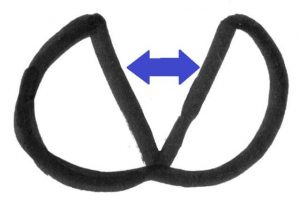
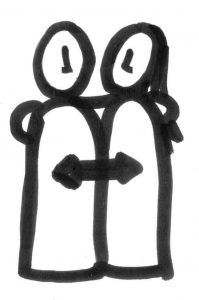
- There is nothing in the text that would stress their difference, their contrast, even less ‘different job description’ or ‘difference in value or status’, ‘hierarchy’ or any of that.
- The picture of God’s perfect creation in Gen 1-2, the way He wanted really wanted it, is one of unity, equality, sameness, mutuality, appropriateness, of shared origin and shared destiny.
- They freely choose each other. The authority of their marriage is in their choosing each other. In this first marriage there is neither the agency of parents, nor is there mention of God officiating.
- When the Pharisees come to Jesus with technical divorce questions (deduced from ‘limiting damage’ type laws in Deuteronomy), Jesus takes them right back to Gen 1-2, Jesus takes them back to the way marriage was meant! What God really wanted! The heart behind it! … not ‘I have a technical right to divorce my wife’ … (Mth 19:3-6, Mrk 10:2-9).
- Contrast to Greek Mythology: woman is descended from one of 10 animals (9 being bad, one being okay, the ‘bee’). Also: woman (Pandora) was created by the gods as a revenge on man (Prometheus) for stealing fire. She is the ‘irresistible but destructive’ punishment, ‘sweet poison’, he can’t resist her, but she will destroy him … woman is a deceiver, a trap, a punishment, a curse, a destroyer … How unbelievably much higher is the view of God in Genesis!
Gen 2:24
leaving and cleaving
“Therefore a man leaves his father and mother and clings to his wife, and they become one flesh.
- ‘Cleave’, ‘cling’, ‘adhere’, ‘আশ্ক্ত হবে’, ‘মিলিত হবে’ … to stick, to not go away
- To find this verse here, as an essential part of God’s perfect created order of Gen 1-2, and deliberately stated at a time when it is not yet ‘strictly necessary’ (Adam and Eve do not have parents, so who is there to leave?) shows its utmost importance:
- God ordains a new center, new authority, new priority … when a person marries, the relationship with parents will become different, not bad, but different.
- Decision making must change, authority and responsibility is with the couple, the new family … decisions for each other, for provision, for children … authority is no longer with the old family, but with the new.
- God defines what he means by ‘family’: it doesn’t mean ‘extended family’, but ‘husband and wife, and children born to them’. God protects the new family of two consenting adults over the ‘old family’.
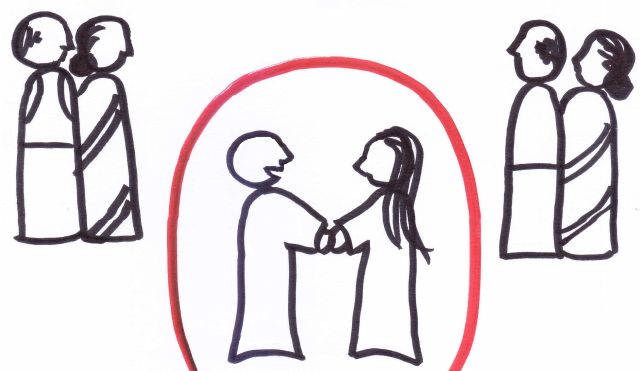
- God establishes a rhythm of unity, separation, new unity, fruitfulness going into further generations … in science: no reproduction without separation.
- The man must leave, that’s the minimum. Not a gender-inclusive command, but specifically to the man. This seems to indicate that if the new couple is at all co-living with parents, it should be her parents, not his. What is totally ruled out is the new wife coming into an existing, established household trying to find her place in it (which is standard in Bangladesh).
- Leaving … separation is essential, parents should prepare for children to become an adult and be released, letting them go, … parents should not ‘hold on’ or ‘try to influence’, they should actively work to release.
- Humans were not told to rule over each other, in the same way parents are not meant to rule over adult children. To release children into adulthood and independence (and marriage to another person) is godly.
- In child rearing therefore the ‘continual obedience of my child to me’ is not the goal. Obedience is a necessary step for the child in the growing up years, but it is neither the goal nor the desired end state as an adult. I need to raise my child to become a self-directed, responsible adult, not ‘an extension of myself’.
- If parents are not releasing, this verse indicates that the adult child must take the initiative and ‘leave’. Maybe the command is to the male adult because the female adult had less power to do so, culturally. The male adult should stand up for the independence of the new family unit.
- God in this chapter doesn’t control their choices, their marrying, neither their choice to eat the forbidden fruit. God raises them up to make own choices, not controlling them, rather releasing, allowing them to separate themselves from him. God models this attitude that he also requires of parents.
- The ‘mother-in-law’ problem: As long as the value and the identity of a woman is in her marriage, her husband, her family, and especially in her son, so long a woman will be unable to release an adult son appropriately. If ‘he is my life, my identity, my honor, my calling, my sole purpose, my security, my only power’ … how could I release him? This sets up the mother in competition for influence with the daughter-in-law … leading to power-struggles, emotional pressure, manipulation. Will my son still obey me?
- All this is before the fall, there is no sinfulness yet. But if there is no sin, no bad tension, no bad relationship, no conflict, is there still a need to leave? … God seems to stress that this is still a need: Do leave. Even if relationships are good.
- What does ‘leaving’ teach the man? How is it good for him? … again a self-discovery: if you are separated, you will understand the weight of decision, responsibility. If you just keep living they way you always lived, it’s harder to realize the need for new common decisions, the establishment of a completely new family. Example: highly trained Bangladeshi heart surgeon with wife and three children, still having no separate money management from his mother.
- Who establishes a marriage? Parents? God? … There are no parents at this point to ‘give in marriage’. God? It doesn’t mention him arranging the marriage.
- A marriage is made by the will, choice, final decision, oath of the two people marrying … Parents are not barred from counseling or helping find a spouse, but the authority of the marriage comes from the two people marrying, freely choosing each other.
- Num 36:6 about the daughters of Zelophehad: “Let them marry whom they think best” … seems to support the free will decision of the one getting married.
- 1 Cor 7:39-40 leaves it up to a widow to ‘marry anyone she wishes, only in the Lord.” Again the principle of free choice by the person marrying.
- East and West: It is legally possible to marry against the will of parents, the couple only needs two witnesses, and anyone can stand as witness. Dominion is given to humans, they decide, they lay down a free will oath at the wedding. But God considers it binding, even if it was a union against his will.
- Human Rights Declaration: one right is to choose one’s partner freely.
- If family relationships are good, then parental advice is good and helpful and invited and accepted naturally. But if there are tensions in a family, if there is neglect, favoritism, manipulation, control, persecution, … then family pressure in marriage issues becomes very oppressive and destructive. Example of converts, being forced into marriages against their will to ‘correct them’. God declares this to be an illegitimate use of authority by this verse (Gen 2:24).
- They will be one flesh? Marriage ceremony depicts the choice, the spiritual reality, besides the physical reality. Strong’s: ‘flesh’, by extension means ‘body’ and also ‘person’.
- In 1 Cor 6:15-18 Paul affirms the unity of a human, body and soul / spirit. What I do with my body has an effect on my spirit. Going to a prostitute means uniting a human, in which the Spirit of God dwells with a prostitute, which is never acceptable. There is a link between physical union and spiritual union. But ‘sexual relations’ on their own do not constitute a marriage.
Gen 2:25
naked and unashamed
“And the man and his wife were both naked, and were not ashamed”
- Do not misunderstand this verse: They are not ‘stupid-innocent-overly-simple’.
- They are not ashamed, for: what should they be ashamed of? The body God gave them? Of course not. There is nothing to be ashamed of, they are at peace with themselves, with God and with each other.
- Differences only become threatening, when there is sin, selfishness, competition, hierarchy and fear.
- Shame means to not be at peace with myself, uncomfortable, unsatisfied, feeling the need to cover, to pretend … I don’t like myself > am afraid others will know who I am, therefore I have to appear better, pretend, deceive, hide. Shame is feeling inferior, it is self-destructive. It’s the beginning of mental problems.
- Why is this verse here? To show what sin will destroy. Sin will destroy all relationships: the relationship with myself, with other humans, with God and with creation.
- Humans have a deep desire for intimacy, for being known for who I really am and still be loved and accepted. We desire to be able to be ‘open, known and still loved’, to be ‘naked and unashamed’.
Gen 3:1-5
Satan and Eve
- Eve really knows what God has said. She cannot claim ‘lack of knowledge’.
- She also cuts right through Satan’s confusing and ‘pitying’ ‘are all trees forbidden’? She corrects it with truth immediately: only one tree is forbidden.
- But she adds to the word of God ‘don’t touch’. Is this the beginning of doubting God’s character? Beginning of legalism? The beginning of coveting? Is it the normal bend of the human mind to make ‘Pharisaic fences’, to make the law harsher than it is to ‘ensure obedience’?
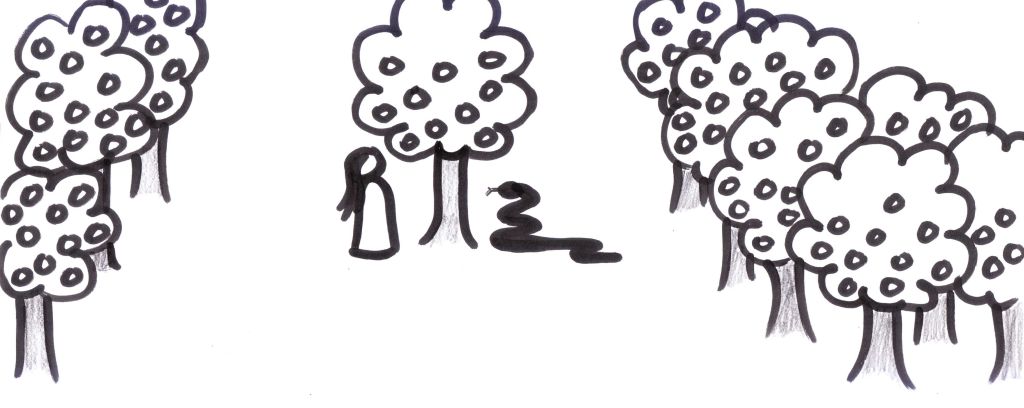
- Possibly this ‘Pharisaic fence’ hurts her, when she picks the fruit (touching it) and nothing happens, and then she eats it, ‘seeing that nothing happened’.
- Satan’s temptation really is a joke: Adam & Eve already ‘are like God’, they are ‘in God’s image’, made dependent on nothing they may do. Satan tempts with what they already have, and with what he really can’t give.
- Maybe Satan tempts by introducing a ‘merit factor’: ‘if you do this, then you will be like God’, making it something they can achieve for themselves. Again a lie. God gave ‘God likeness’ to them as a gift, a calling, something coming out of being in relation with God.
4 But the serpent said to the woman, “You will not die, 5 for God knows that when you eat of it your eyes will be opened, and you will be like God, knowing good and evil.”
- Why is Satan first speaking to Eve? Because she didn’t hear the command directly? Because she is more weak? More prone to temptation? … or is it random, to which Satan speaks first, as both are there?
- Female versus male characteristics … does Satan go for Eve first because of woman as influencer? As helper, here in the negative? Seducer? … In Gen 3:17 God does say ‘because you have listened to the voice of your wife and have eaten of the tree’ … so Eve was influencing Adam. Maybe once she sinned, trying deceptively to get him to co-sin?
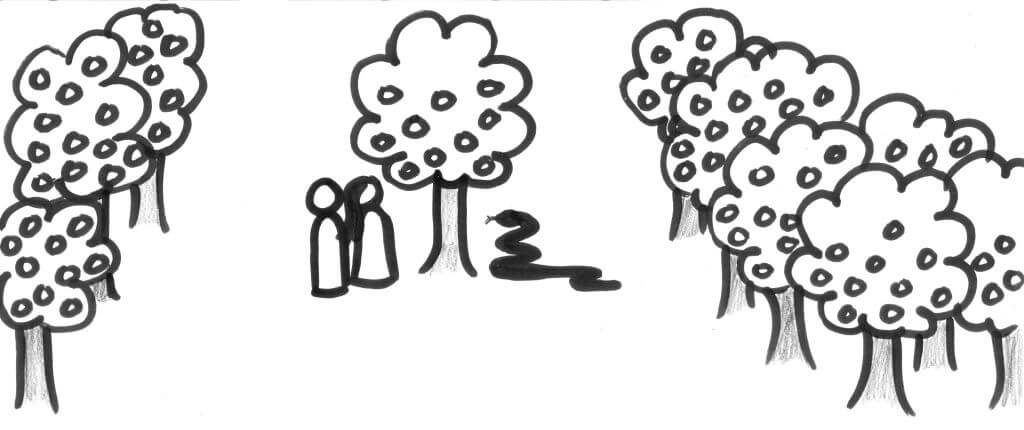
- But: Adam is right there (Gen 3:6), hears the whole conversation and doesn’t speak up, correct or warn her, and he doesn’t resist sin for himself either.
- Some teach: Woman is more easily deceived, more sinful than man. But then Adam is right there and God will hold both equally accountable.
- Some teach: the woman is in trouble because she is alone. Do not leave woman alone, to herself, she needs to be watched, controlled. But again: she wasn’t alone, she is given choice and held accountable for her choice by God, just as the man is.
Gen 3:6
Both sin
“So when the woman saw that the tree was good for food and that it was a delight to the eyes, and that the tree was to be desired to make one wise, she took of its fruit and ate; and she also gave some to her husband, who was with her, and he ate.”
- Eve and Adam have no reason to doubt the goodness and goodwill of God so far. All they have seen of God’s behavior is God’s graciousness, God’s giving of power and authority to them, God blessing, God seeking their fellowship …
- More than anything this is a breech of trust in God: against evidence they choose to mistrust God’s character and word and rather believe Satan. They choose of accommodate themselves, rather than take everything from God’s hand. To take ‘something for yourself against an other’s interests’ is a violation of ‘Trinity-like’ relationship, for inn the Trinity there is no ‘selfish independent grabbing’.
- Their identity now is no longer rooted in God, but in their act of independence. They are ‘their own center’ now, which means a dethroning of God.
- Adam’s inaction in standing up for her, preventing her sin, but rather joining it
- Some say that Eve gave Adam the fruit and he eats unknowingly. But this cannot be: sin means to to choose against God willfully. If he eats unknowingly this doesn’t constitute sin.
- Many draw from this story much difference between man and woman, but it doesn’t seem justified to me. The story clearly shows they both know, they both eat, they both sin, both consciously choose to disbelieve in God’s goodness and to rather ‘organize what they need for themselves’, both experience the consequences of shame (fear and hiding) and God holds them both accountable.
- Christians, so acquainted with this temptation, have tended to overreact: They think ‘being like God’ is the problem, and deny the honor God gave humans.
- The problem of this story is not ‘being like God’, the problem is ‘independent grabbing for oneself in breech of trust’. Being like God is good and affirmed throughout the Bible: “he gave the power to become children of God” (Jhn 1:12), “we are being transformed into the same image from one degree of glory to another” (2 Cor 3:18), “those whom he foreknew he also predestined to be conformed to the image of his Son” (Rom 8:29), “Therefore be imitators of God as beloved children“ (Eph 5:1), “you are a chosen race, a royal priesthood, a holy nation, God’s own people“ (1 Pet 2:9), Jesus says: “the glory that you have given me I have given them, so that the world may believe” (Jhn 17:22).
Ge 3:7-12
Consequences of sin
“Then the eyes of both were opened and they knew that they were naked; and they sewed fig leaves together and made loincloths for themselves.8 They heard the sound of the LORD God walking in the garden at the time of the evening breeze, and the man and his wife hid themselves from the presence of the LORD God among the trees of the garden. 9 But the Lord God called to the man, and said to him, ‘Where are you?” 10 He said, “I heard the sound of you in the garden, and I was afraid because I was naked; and I hid myself.” 11 He said, “Who told you that you were naked? Have you eaten from the tree of which I commanded you not to eat? 12 The man said “The woman whom you gave to be with me, she gave me fruit from the tree, and I ate. 19 Then the LORD God said to the woman, “What is this that you have done?” The woman said, “The serpent tricked me, and I ate.”
- Both are addressed by God and considered guilty and responsible.
- Their ‘eyes opened’, one kind of ‘knowledge’ does indeed increase, they now know sin, shame, guilt, fear, separation and isolation.
- They ‘know they are naked’ … the sense of shame and fear has entered their lives. They are no longer comfortable with themselves, no longer at peace with themselves > Sin leads to a breaking of relationship with self.
- They are now ashamed, feel fear, a need to cover up, to guard, to hide, to pretend, to deceive, to scheme, to control … they lose frankness, simplicity, honesty, openness, playfulness, ease and comfort. Inferiority and depression develop. This is the beginning of mental problems or disease.
- Why loin cloths? Why do they instinctively cover genitals? … sense of shame, tension, need of self-protection, differences between genders now become problematic, threatening. Possibly because they now will pass down tragedy to their descendants?
- The genealogy in Gen 5:5-25 is the only genealogy that repeatedly stresses ‘and he died’. Emphasis on death, them passing on death to their children
- They hide themselves from God > shame > breaking of relationship with God
- Their knowledge is reduced: hiding behind trees from the all-knowing, ever present God, blaming others when that only makes things worse, stupid arguments
- “Where are you?” and “Who told you that you were naked?” are thought-provoking, conscience-inducing questions. It’s not that God doesn’t know. But God is taking them back to the reason, the real problem … ‘have you eaten from the tree?” this is conviction, it’s also a chance to acknowledge, to confess, to repent, to take responsibility ‘God, I am so sorry!’
- Neither man nor woman confesses sin, repents, asks for forgiveness nor takes responsibility, rather Adam blames Eve and God, and Eve blames Satan. They are now sacrificing each other to save their own skin, selfishness is revealed instantly > breaking of relationship between humans.
- Ultimately to blame humans, Satan, circumstances or God all comes to the same: the important thing is that I refuse to take blame, refuses to take responsibility.
Ge 3:16-19
Consequences of sin by gender
“To the woman he said, “I will greatly increase your pangs in childbearing; in pain you shall bring forth children, yet your desire shall be for your husband, and he shall rule over you. 17 And to the man he said, because you have listened to the voice of your wife, and have eaten of the tree about which I commanded you, ‘You shall not eat of it,’ cursed is the ground because of you’ in toil you shall eat of it all the days of your life; 18 thorns and thistles it shall bring forth for you; and you shall eat the plants of the field. By the sweat of your face you shall eat bread until you return to the ground, for out of it you were taken; you are dust, and to dust you shall return.”
- Effect and consequences of sin is given by gender … Yet how gender specific is this really? Women will also die, will also work ‘by the sweat of their faces’ but that is only told to the man. Women experience pain in child birth, but men also experience pain in other situations.
- Woman: pain in childbirth, role struggle with husband, being ruled by husband … pain, sorrow, worry, insecurity, mental and emotional pain
- Man: hard work now, trouble to provide, decreased fertility, death
- Is this God’s proactive will (new command / prescriptive) or is it a description of reality affected by sin (prophecy / descriptive). The Hebrew wording allows for both options. Two opinions prevail:
- husbands now should rule over the wife, this is God’s will now, a command
- in a sinful world husbands will lord it over their wives, but that’s sinful and not God’s will
- Problems with Option 1: Did God change his mind from Ge 1-2 to Ge 3? Does he now abolish equality and mutuality and introduce hierarchy and rulership over each other? Why should a husband, who equally sinned, be ‘rewarded’ by ‘ruling’? Also when Christ does his redeeming work it finds expression in abolishing hierarchy (Gal 3:28) “there is no longer male nor female”.
- Problems with Option 2: If God didn’t mean for husands to rule and doesn’t agree with how this verse has typicallly been understood, then why does he leave this sentence so ‘unclear’?
- My opinion: God didn’t change his mind. Rather humans are still meant to reveal the Trinity, but now sin and selfishness will mar this. But that’s the curse, not God’s new ‘best idea’.
- The way we answer that question has vast implications: What does God want for a godly Christian marriage? Does he want the husband to rule over the wife? Or should a Christian marriage be characterized by equality, mutuality; and a unity of willing equals?
- Who exactly is cursed in this text? Neither woman nor man, but Satan and the ground.
- Why the ground? Maybe God curses it to reduce fertility, to reduce multiplication, to limit time to do evil because much time is used in survival > relationship with creation broken
- This doesn’t mean that we can’t pray for the fertility of our fields, improve agriculture, ask for God’s blessing and wisdom, improve things by adherence to his principles. We can seek God’s redemption in all areas.
- What is now limited? … life, life span, fertility, agriculture, production, free time, authority to rule … In Ro 8:17-25 Paul describes how creation is subjected to futility & decay because man sinned, but that creation will be restored beyond imagination once humans will be fully redeemed.
- What is sin’s effect on family? Conflict in husband-wife relationship, busy providing, barely allowing time to take care of family, parental model to the children is tainted
- Ge 3:16 Since trust and security is broken, spouses will now scheme to obtain what they need, leading to manipulation, control, nagging, un-peace and competition.
- Some say: Adam and Eve had sex only after the fall. Sex was not part of good Eden.
- Yet the command to multiply was given from the beginning and for ‘life in Eden’.
- Maybe with the fall sex becomes a more driving force, sex becomes more selfish, not ‘how do I give?’ but ‘how can I get?’
- Adam and Eve’s spiritual death is immediate, their separation from God. Though they do not die on the spot, their physical death is now a certainty: ‘to dust you shall return’ (Ge 3:19).
Gen 3:15 Promise of redemption
“I will put enmity between you and the woman, and between your offspring and hers; he will strike your head, and you will strike his heel.”
- While cursing Satan God promises that one will come, a descendant of the woman (the human race). He will suffer by the hand of the snake but ultimately defeat it: Jesus. The first messianic prophecy in the Bible, and it’s given right after the fall.
- How gracious of God to promise a unilateral, priceless salvation to people who haven’t even acknowledged yet that they sinned!
Gen 3:20 Separate Names
“The man named his wife Eve, because she was the mother of all living.”
- ‘Eve’ resembles the word for ‘living’.
- It seems their unity was such (before the fall), that there was no need for separate names. Now individual names are introduced, a sign of the broken unity between them.
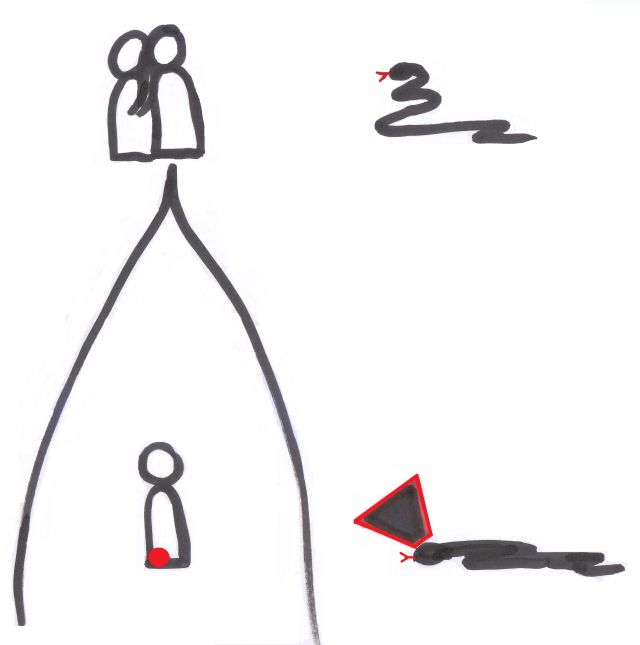
Gen 3:21
First sacrifice for covering sin
‘… God made garments of skins for the man and for his wife, and clothed them.
- Skins for garments means this is the first time an animal dies, the first time death occurs, the first sacrifice of an animal. Death was not part of God’s original creation, but now – because of sin – it is a present reality.
- “For the wages of sin is death” (Rom 6:23) and ‘without blood there is no remission of sin’ (Heb 9:22). So Gen 3:21 is an advance picture of the sacrificial system in the Law of Moses (Lev 1-7, Num 28-29). And more importantly: an advance picture of the Jesus dying on the cross.